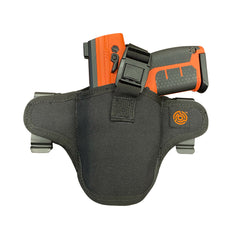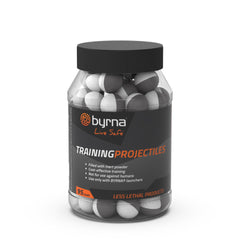
The car storage laws for defensive weapons are a mess, and if you've ever tried to figure them out, you already know what I mean. One state lets you legally have a loaded handgun in your glove box with no permit needed. But then you drive across the state line, and suddenly that same exact setup could land you with felony charges. Federal properties add more confusion because they have their own set of laws that completely override whatever your state says is okay.
The whole situation gets even tougher once you look at the fine print of each state's laws. Some states are completely fine with glove compartments as a storage location. But other states specifically prohibit it. Michigan has this weird distinction where it treats glove boxes and center consoles as 2 very different legal categories. California takes it to extremes and actually says that glove compartments don't even count as a "locked container" under their legal definition. You could be following all the laws in your home state and then accidentally break the law just by crossing an invisible county line or by driving past a school zone without realizing it.
These technical distinctions do matter, and prosecutors will charge drivers for violations that most of us would think are pretty minor. A routine traffic stop can turn into criminal charges based on where you happened to place your firearm just 5 minutes earlier. The legal situation is always changing, too, and makes it even harder to stay compliant. South Carolina actually overhauled their vehicle storage laws in March 2024 after constitutional carry laws were finalized there.
Here's what you need to know about legally storing defense items in vehicles!
Table of Contents
Laws That Vary By State
State laws about glove box weapon storage are all over the map, and what's completely fine in one state could get you arrested if you drive just a few miles across the state line. Texas is actually pretty relaxed about the whole situation - under Penal Code 46.02, you can store a loaded handgun right there in your glove box, and you don't even need a permit for it. California takes a very different stance, though. Firearms have to be unloaded and locked either in the trunk or in a locked container in California, and the glove compartment specifically doesn't count as a valid option.
The fine print makes it even tougher. Michigan law actually makes a distinction between your glove box and your center console for weapon storage purposes. One of them could be completely legal for storage - the other one could get you into legal problems. These kinds of distinctions matter because a routine traffic stop could turn into an arrest if you haven't done your homework on the local laws.

Federal law does give you some level of protection when you're traveling from one state to another. The Firearms Owners Protection Act of 1986 says that you can transport firearms through states with stricter laws as long as you're legally allowed to have them where you started your trip and where you're going. The problem is that you need to have the weapon unloaded and locked away from the passenger compartment for this protection to apply. If you stop overnight somewhere or take a detour from your direct path, that federal protection goes right out the window.
Local laws just make everything even more confusing. Chicago used to ban handguns completely, even when Illinois state law said they were fine. Cities and counties can still pile their own restrictions on top of whatever the state laws already say. What that means is that you'll need to research the state laws and the local laws to be confident that your glove box storage plan is actually legal. Commuters who cross state lines for work face this headache every day.
How Your Permit Affects Vehicle Storage
Your concealed carry permit actually affects the legality of what you're allowed to store in your glove box. Most states draw a hard line between legal and illegal storage, and where that line falls usually depends on whether you have a valid permit in your wallet.
North Carolina gives us an example of how this works in practice. Without a permit, your firearm needs to either be visible on the seat next to you or locked away in the trunk. Once you get that concealed carry permit, the glove box turns into an acceptable storage option. The entire legal framework changes based on that one document.

Cross-border travel with a firearm gets tough fast. A permit that works fine in your home state could be completely useless once you cross into another state. The frustrating part is that even the states supposedly recognizing one another's permits still have wildly different laws for where and how you can store your weapon in a vehicle. One minute you're doing everything right under your state's laws, and 5 minutes later, you could technically be breaking the law in a big way just because you passed a state border. The Supreme Court handed down its ruling in NYSRPA v. Bruen in 2022, and it completely changed the permit laws across the entire country. The legal situation around these permits is still changing fast as the states adapt to the new laws.
Permit holders walk around with a pretty risky misconception about what their permit actually lets them do. The assumption is that once you have the permit in hand, you can store your firearm in the glove box, no matter where you drive - it's just not how it works. Florida law specifically says that permit holders can store their firearms in the glove box. But Massachusetts will nail you for doing the exact same thing. The differences from state to state are wild.
Any time you're planning a trip, you need to research the permit and vehicle storage laws for every state on your trip. The states you're driving through matter just as much as the place where you're headed!
How Location Changes Your Legal Status
Federal property operates under a very different legal framework than what you're probably used to in your state. Your state laws might give you every right in the world to have a weapon stored in your glove box as you drive around town. Once you cross onto federal land, though, those state protections disappear. Military installations and VA hospitals enforce their own strict laws that completely supersede whatever permissions your home state has granted you. Federal courthouses are even more restrictive - they follow 18 U.S.C. § 930, which prohibits weapons on the entire property without exception.
National parks add yet another layer of difficulty to the whole situation. Some parks will actually let you follow your state's concealed carry laws as you're on park grounds, but others have their own strict federal prohibitions. The laws change wildly from one park to the next, and there's no consistency that you can predict which laws apply where. You'll need to research each particular park ahead of time if you even think about driving through with anything in your vehicle.
The legal situation around interstate travel is where the challenges start to get especially messy. The Firearm Owners Protection Act was supposed to protect law-abiding citizens who need to transport their legally-owned items through states with stricter laws than their home state. But the Revell v. Port Authority case shows us just how weak those protections can be. Revell was just passing through New Jersey when his flight got delayed. He had to stay overnight because of the delay, and somehow that one unintended stop meant he lost every bit of his federal protections. He was arrested for it.

A quick gas stop can change everything about your legal status. That same item in your glove box that was completely legal just 5 minutes ago could now be a felony. State laws take over when you cross the state line, and it doesn't matter if you live there or if you're just on your way somewhere else. They don't care that you're only there for 10 minutes to fill up your tank.
The Gun-Free School Zones Act is one of the laws that can trip you up at the worst possible second. Most drivers have no idea that they're breaking federal law. But almost every path through the city takes you within 1,000 feet of a school at some point. Federal law says you need the right permits for each area you drive through, and without them, your normal drive to work could land you in legal problems.
Post offices have them as well. The entire property, like the parking lot outside, counts as federal property under the law. You might just want to mail a package quickly, but once you pull into that parking lot, you could be violating federal law without even realizing it.
Legal Storage Options for Your Vehicle
Lots of states have pretty strict laws about what counts as safe storage, and your standard glove compartment probably won't cut it in most places with strict laws.
Locked containers that bolt directly to your vehicle frame are usually your safest bet to meet the laws, even in states with the toughest laws. Console vaults are a common option that drivers like because they sit right between your seats and lock up with either keys or a combination lock. Under-seat safes are another idea that work the same way, except they're mounted underneath where you sit. It'll give you a level of security that your factory glove box just wasn't designed to give you.
The trunk brings up a whole different set of legal issues. Some states say that you need to have firearms stored in the trunk during transport. Other states have laws that don't allow ammunition to be stored anywhere near a weapon if the gun and ammo are in the trunk. California law treats the trunk as just another part of the vehicle. But Illinois law considers it to be a completely separate storage area that has its own laws.

Court rulings have made the whole situation even tougher. One judge in one jurisdiction might rule that a locked briefcase qualifies as safe storage. A different judge in a neighboring state could rule that the exact same briefcase doesn't satisfy their laws. The definition of what "locked" actually means changes wildly from court to court.
Lots of drivers also confuse concealed storage with secured storage, and these are two very different legal concepts. Concealed just means that it's out of sight. Secured storage needs keys or a combination to access. Where you live determines if the law calls for one, the other, or both of these laws.
Quick-access safes are a decent middle ground between compliance with the law and the ability to get to your items if you actually need them. They lock securely enough to meet the laws in most places. But they can still open in just a few seconds when it counts. Be careful with vehicle modifications, though - hidden compartments could accidentally violate laws that were actually meant to stop drug dealers (not standard gun owners).
What Happens When You Break the Law
Glove box storage for your firearm is convenient. But if you do it the wrong way, you can land in trouble - the consequences range from a basic citation to legitimate felony charges. The penalty you get can largely depend on where you are and if your local prosecutor decides to make an example out of you that particular day. Every jurisdiction treats these violations in its own way, and some counties might let you off with a warning, while others will prosecute even the smallest storage mistake to the fullest extent of the law.
Most drivers who get into hot water with glove box storage laws don't even know that they're breaking them until it's too late. A cop pulls them over for speeding or a broken taillight and then asks if there are any weapons in the car. The driver says yes, there's one in the glove box, and suddenly everything changes. State v. Clark shows just how bad it can get. That driver was looking at 2 years in prison because his firearm wasn't secured in the way his state requires it for vehicle storage.

Law enforcement's approach to these situations changes dramatically from one part of the country to another. Some officers focus mainly on whether a person is legitimately trying to follow the law, and those officers might issue a warning and send you on your way. Other officers enforce every technical violation just as it's written in the statute. Primary enforcement states actually allow officers to pull drivers over just for suspected storage violations. Secondary enforcement states need their officers to have another reason for the stop before they can even ask about weapon storage.
Criminal charges are just the beginning of the problems you might run into, though. Improper storage can completely destroy your self-defense claim if you ever actually need to use that weapon in an emergency. Courts have ruled that illegal storage can negate justification defenses - even in cases where the use of force would have been completely lawful otherwise.
What devastates drivers is the collateral consequences that come after any criminal penalty. A concealed carry permit gets revoked. Federal firearm ownership rights disappear permanently. Professional licenses vanish and future job prospects evaporate overnight. Even an honest mistake can trigger all these consequences because intent almost never matters in storage violation cases - the system just doesn't care that you thought your glove box was a legal storage option or that you misunderstood the exact laws of your local area.
Protect Yourself and Your Family
Research into state laws can make anyone feel like they need to pass the bar exam just to drive safely from one state to another - it takes a genuine effort and non-stop attention to stay compliant with all these laws, and the worst part is that legislators can change everything during any given session. Something as basic as keeping personal protection tools in your car shouldn't need this level of legal research, but that's the latest situation. The difference between a normal traffic stop and a legal issue can come down to whether you understood the particular laws in that particular jurisdiction.
The great news is that more resources are available now for keeping track of what's legal and what isn't when you're storing items in your vehicle. Legal apps and databases can live right on your phone now, and local groups actively monitor when laws change, and they'll ping you with updates the second that anything changes in your state. If you drive through 3 different states for work each week or you're on federal property all the time, it's probably worth it to pay for a lawyer to talk to you about everything. A few hundred dollars for legal advice sure beats the alternative of ending up with criminal charges.

We could be just what you need to skip the whole legal difficulty altogether for personal protection as you drive. Our less-lethal defense tools are completely legal in all 50 states and need zero background checks, and let you cross any state line without having to double-check your legal status every 5 minutes. You're ready to defend yourself with the patented pull-pierce CO2 system. Our product line includes everything from pistols and rifles to armored ballistic backpacks.
Check us out at Byrna.com and you'll see why tens of thousands of reviewers have already figured out how to stay safe without all the legal complications that have traditional options. No matter which direction you go with your personal protection strategy, what matters the most is taking the time to know your options and then making decisions that actually fit your lifestyle and personal circumstances.




